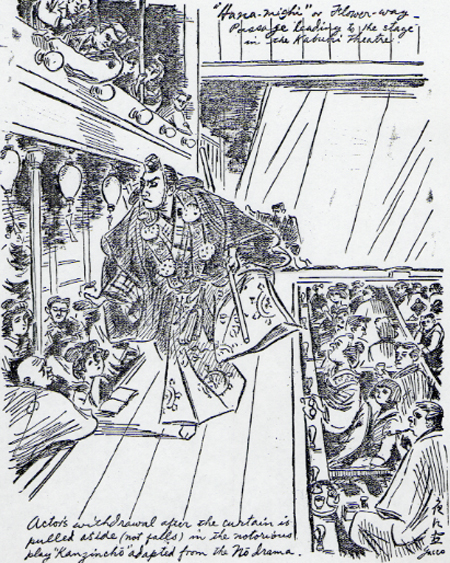|
Theatre and the Kabuki, 1947

Text by Alvin Grauer. Illustrated by Takamori Yakko.
"The Kabuki play might be called the Popular Drama of Japan. It is a combination of Japanese music, brilliant costumes, exquisite setting and a curious kind of melodramatic acting interspersed with frequent, sometimes very vivid, dances. It is far more popul1ar than the 'Noh' or classic drama which, with its chants, masks, and chorus is deadly formal. There are no women in the Kabuki play. All female parts are taken by men. A good Kabuki play is a thrilling experience. The word Kabuki combines three words meaning "song-dance accomplishment” and there is a sense of colorful play and drama throughout most of a good Kabuki production. It takes time, however, to get used to the highly curious orchestra (seated at the side or back of the stage), which produces weird cries and chants impossible to describe, but that accent the stage action. The drawing shows Koshiro, one of the oldest and most famous of the Kabuki actors, in one of his favorite parts in the play "Kanzincho” [Subscripton List]. Koshiro, still lively and active, is 77 years old. In this final scene after the curtain has been drawn he dances the "Dance of Longevity," from-the stage down the Hanamichi (flower-way) toward the back of the theater. Seats along the Hanamichi are highly desired.
Don't look for ideas in a classical Kabuki text, Look for emotion. Under the Shoguns, the militarists and the "thought police", Japanese playwrights had to watch their step--so you see little emphasis on content, but more on hopeless love affairs, loyalty of the servant, and sword play, embroidered with costume.
Japanese love modern theater, too--and Tokyo is the center of it now. Despite the shock of war (and peace) , Tokyo produced in 1946-7 "Abraham Lincoln" by John Drinkwater, “Ah Wilderness” by Eugene O'Neill, “Midsummer Night’s Dream“ with Mendelssohn's music, Gorki's "Lower Depths" (very well done, too), "Watch on the Rhine," and spirited original plays and playlets. Not much of this gets beyond Tokyo and the bigger cities, but where it is available, the Japanese gobble it up." .........................
From: Grauer, Alvin. So I Went to Japan. Tokyo: Nippon Times, 1947.
|
